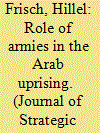| Srl | Item |
| 1 |
ID:
169099


|
|
|
|
|
| Summary/Abstract |
Why would politicians recruit soldiers for military coups d’état? The civil–military relations literature assumes politicians aspire to supremacy over the military; enabling praetorianism would risk their future rule. While civil–military relations widely recognizes the empirical fact of civilian participation in military takeovers, no study specifies or theorizes the topic. This essay examines the conditions in which politicians recruit soldiers to seize power by investigating the understudied processes of military takeovers. Using British Foreign Office documents, Arabic language memoirs, and Polity data, I find that civilian statesmen in Iraq (1936) and Syria (1951) could not tolerate their civilian rivals’ incumbency but were unable to challenge them peacefully, so they recruited like-minded officers for coups. This suggests that while politicians do not necessarily want the army in the chambers, they sometimes favor praetorianism to the continued rule of their civilian opponents.
|
|
|
|
|
|
|
|
|
|
|
|
|
|
|
|
| 2 |
ID:
120281


|
|
|
|
|
| Publication |
2013.
|
| Summary/Abstract |
The following special issue on the role of armed forces focuses on what explains the considerable variation in the both how these uprisings palyed themselves out and their political outcomes.At least three basic dimensions - duration, political intensity and the magnitude of violence - the variation between the six states covered in this issue - Egypt, Syria, Libya, Tunisia, Yemen and Bahrain - has been considerable even on a proportionate basis. The range of political outcomes within these six cases has been considerable, ranging from a more or less stable transition to democracy in Tunisia to the Syrian case where there is considerable fear that Syria will break up into sectarian mini-states.
|
|
|
|
|
|
|
|
|
|
|
|
|
|
|
|
| 3 |
ID:
120293


|
|
|
|
|
| Publication |
2013.
|
| Summary/Abstract |
The following special issue on the role of armed forces focuses on what explains the considerable variation in both how these uprisings played themselves out and their political outcomes. At least three basic dimensions - duration, political intensity and the magnitude of violence - the variation Between the six states covered in this issue - Egypt, Syria, Libya, Tunisia, Yemn and Bahrain - has been considerable even on a proportionate basis. The range of political outcomes within these six cases has been considerable, ranging from a more or less stable transition to democracy in Tunisia to the Syrian case where there is considerable fear that Syria will break up into sectarian mini-states.
|
|
|
|
|
|
|
|
|
|
|
|
|
|
|
|